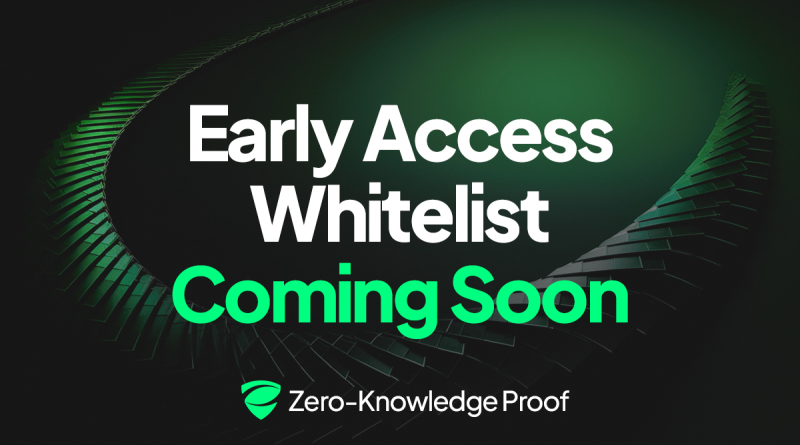Zero Knowledge Proof Whitelist Coming Soon: Building a Privacy-First Identity Layer for Web3
Every online interaction begins with identity. To sign up, trade, or play, users must prove something about themselves, often more than they should. Each login, passport scan, or wallet connection creates a digital footprint that can be traced, stored, or sold.
For years, Web3 promised to change this narrative, offering decentralization as a form of digital freedom. Yet, true privacy has remained elusive. Networks still demand exposure to confirm trust. Now, Zero Knowledge Proof (ZKP) is providing the answer.
As the Top Crypto Presale approaches, ZKP’s architecture is being recognized for pioneering a new identity model where users can verify facts—like age, credentials, or location—without revealing who they are. It’s a system that replaces invasive verification with mathematical truth.
The Problem with Digital Identity
Digital identity has always been a double-edged sword. The more information users share, the more seamless their experiences become. Yet, that same openness creates risk of data leaks, identity theft, and surveillance.
Blockchain made identity decentralized, but not private. Wallets expose transaction histories, linking users to every move they make on-chain. This visibility might ensure transparency, but it undermines personal sovereignty.
ZKP introduces a shift in perspective. Instead of proving identity by showing data, users prove it by sharing cryptographic evidence that a fact is true. You don’t reveal your ID; you simply prove you have one. You don’t disclose your income; you confirm you meet financial criteria.
This privacy-first logic changes how people interact online. It’s the next step toward a digital world where verification no longer comes at the cost of exposure, a vision that positions ZKP among the Top Crypto Presales 2025, leading the evolution of decentralized identity.
How ZKP Makes Privacy Practical
At the heart of this innovation lies a simple yet powerful principle: proof replaces disclosure. ZKP’s architecture allows users to generate cryptographic proofs that validate information without revealing its source.
Here’s how it works in practice:
- DeFi Users can prove they are KYC-verified without sharing personal data, allowing institutional-grade access while maintaining anonymity.
- Gamers can verify eligibility for tournaments or NFT ownership without linking to their real-world identity.
- DAOs and Reputation Systems can verify user participation or voting power without revealing wallet details.
This system doesn’t just protect privacy, it builds trust. Each proof is mathematically verifiable, tamper-resistant, and universally readable across blockchains.

In technical terms, ZKP compresses identity data into proofs that are fast to verify but impossible to reverse-engineer. This creates an identity standard that is portable, scalable, and compliant. For developers, it offers an interoperability framework; for users, it offers control.
This is why ZKP stands out in the best crypto presale discussions. It’s not building another wallet or token; it’s creating a framework that lets humans exist digitally without surrendering who they are.
Real-World Applications: From Finance to Gaming
ZKP’s identity layer isn’t theoretical; it’s designed for real markets where privacy and compliance must coexist.
In finance, institutions can verify AML and KYC checks on-chain while remaining compliant with regulations. This reduces costs, prevents fraud, and opens DeFi to mainstream adoption.
In gaming, ZKP eliminates the need for centralized account verification. Players can prove ownership of in-game assets or reputation metrics while staying pseudonymous.
In governance, DAOs can run anonymous yet verifiable elections, maintaining fairness without tracking personal details.
Even outside crypto, the model has transformative potential. Governments exploring digital IDs could use ZKP to implement secure identity frameworks that protect citizens from misuse. E-commerce platforms could use it for fraud-proof transactions without storing sensitive data.

This universality gives ZKP’s ecosystem staying power. It’s not a product of hype; it’s an infrastructure built for longevity. The Top Crypto Presale reflects that maturity, attracting both privacy advocates and enterprise builders who see ZKP as the next trust protocol for the digital economy.
The Human Layer of Web3
At its core, ZKP isn’t just about cryptography; it’s about people. For too long, privacy and participation have been at odds. You could either protect your data or engage freely, but not both.
ZKP resolves that contradiction. It gives individuals control over what they prove and how. It allows identity to become modular and contextual rather than permanent. In a world increasingly defined by data leaks and algorithmic profiling, this kind of selective visibility is revolutionary.
When the ZKP whitelist opens, it will represent more than early access to a token. It will represent early access to a future where privacy is embedded into every digital interaction by design, not as an afterthought.
For the first time, users can be seen only as much as they choose to be. They can participate without exposure, transact without traceability, and build a reputation without losing control.

